外研版(2019)必修 第一册Unit 5 Into the wild Using language Listening and Speaking 课件(共25张PPT)
文档属性
| 名称 | 外研版(2019)必修 第一册Unit 5 Into the wild Using language Listening and Speaking 课件(共25张PPT) | 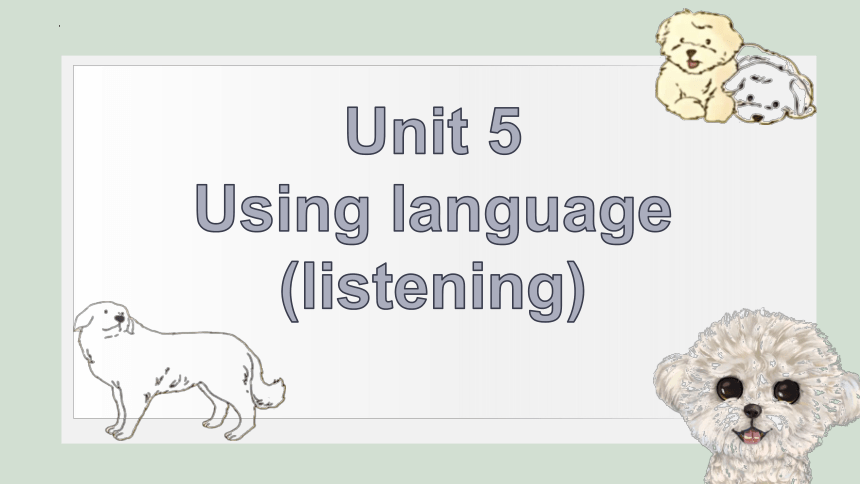 | |
| 格式 | pptx | ||
| 文件大小 | 6.3MB | ||
| 资源类型 | 教案 | ||
| 版本资源 | 外研版(2019) | ||
| 科目 | 英语 | ||
| 更新时间 | 2023-11-23 21:55:58 | ||
图片预览

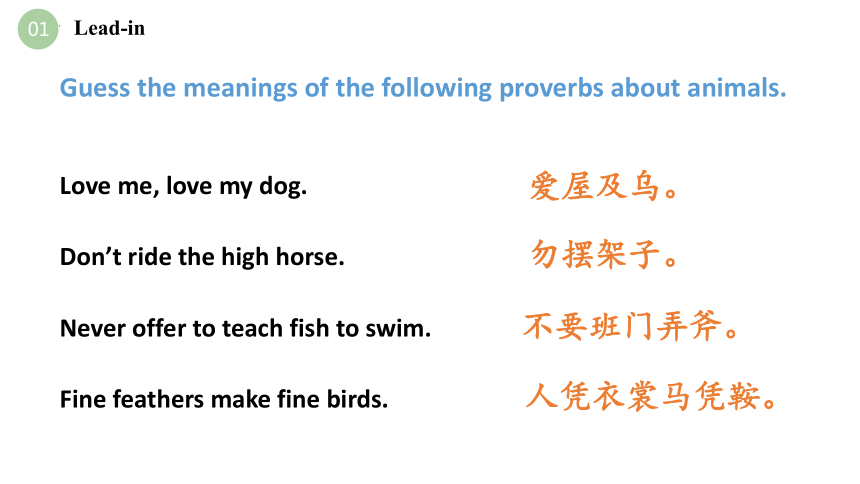
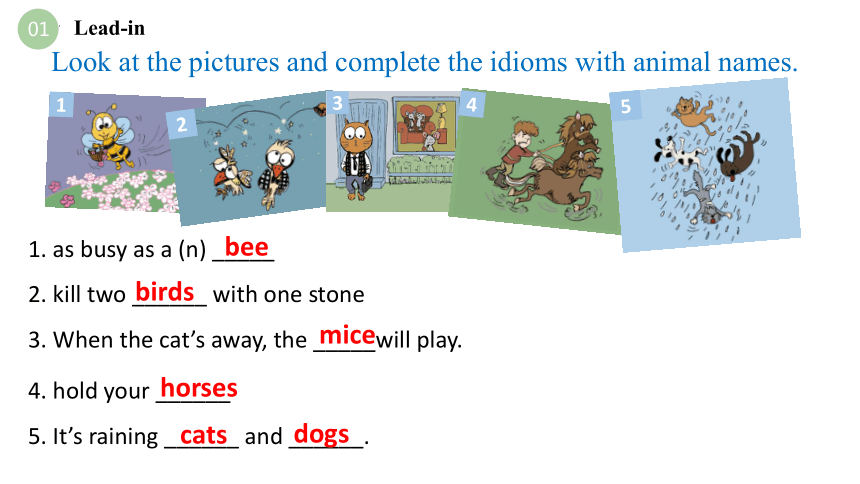
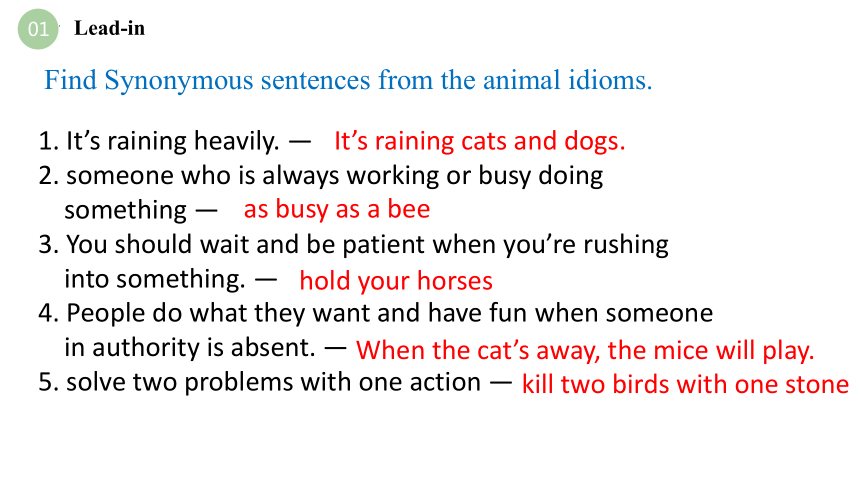
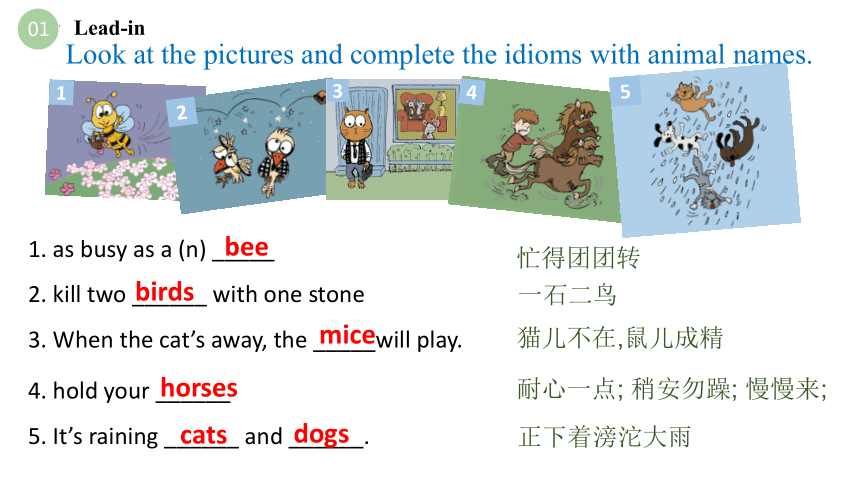
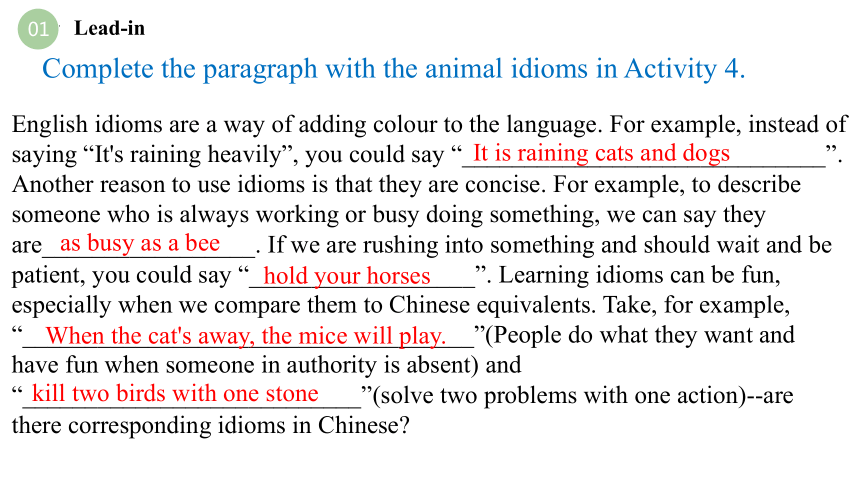


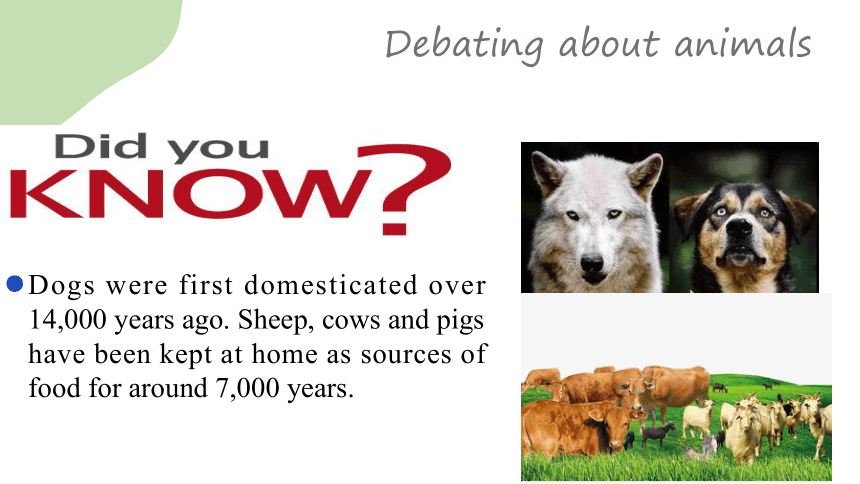
文档简介
(共25张PPT)
Unit 5
Using language
(listening)
Love me, love my dog.
Don’t ride the high horse.
Never offer to teach fish to swim.
Fine feathers make fine birds.
爱屋及乌。
勿摆架子。
不要班门弄斧。
人凭衣裳马凭鞍。
Guess the meanings of the following proverbs about animals.
01
Lead-in
1. as busy as a (n) _____
2. kill two ______ with one stone
3. When the cat’s away, the _____will play.
4. hold your ______
5. It’s raining ______ and ______.
mice
horses
dogs
cats
1
2
3
4
5
bee
birds
Look at the pictures and complete the idioms with animal names.
01
Lead-in
1. It’s raining heavily. —
2. someone who is always working or busy doing
something —
3. You should wait and be patient when you’re rushing
into something. —
4. People do what they want and have fun when someone
in authority is absent. —
5. solve two problems with one action —
It’s raining cats and dogs.
as busy as a bee
hold your horses
When the cat’s away, the mice will play.
kill two birds with one stone
Find Synonymous sentences from the animal idioms.
01
Lead-in
1. as busy as a (n) _____
2. kill two ______ with one stone
3. When the cat’s away, the _____will play.
4. hold your ______
5. It’s raining ______ and ______.
mice
horses
dogs
cats
1
2
3
4
5
bee
birds
Look at the pictures and complete the idioms with animal names.
忙得团团转
正下着滂沱大雨
耐心一点; 稍安勿躁; 慢慢来;
猫儿不在,鼠儿成精
一石二鸟
01
Lead-in
Complete the paragraph with the animal idioms in Activity 4.
English idioms are a way of adding colour to the language. For example, instead of saying “It's raining heavily”, you could say “_____________________________”. Another reason to use idioms is that they are concise. For example, to describe someone who is always working or busy doing something, we can say they are_________________. If we are rushing into something and should wait and be patient, you could say “__________________”. Learning idioms can be fun, especially when we compare them to Chinese equivalents. Take, for example, “____________________________________”(People do what they want and have fun when someone in authority is absent) and “___________________________”(solve two problems with one action)--are there corresponding idioms in Chinese
It is raining cats and dogs
as busy as a bee
hold your horses
When the cat's away, the mice will play.
kill two birds with one stone
01
Lead-in
He is a lucky dog.
Every dog has his day.
Let sleeping dogs lie.
Birds of a feather flock together.
The early bird catches the worm.
Cats hide their claws.
like a cat on hot bricks.
The fox preys farthest from his hole.
a wolf in sheep's clothing
a black sheep
Find more idioms about animals
他是个幸运儿
人人皆有得意时
勿惹是生非
物以类聚,人以群分
笨鸟先飞/早起的鸟儿有虫吃
知人知面不知心
像热锅上的蚂蚁
兔子不吃窝边草
披着羊皮的狼/口蜜腹剑的人
害群之马
A: She’s as busy as a bee.
B: What makes you say that
A: She is currently doing three part-time jobs. I
haven’t seen her for three months./She’s trying to complete her assignment by the weekend…
Work in pairs. Choose an idiom and describe a situation with it.
sample
Debating about animals
Dogs were first domesticated over 14,000 years ago. Sheep, cows and pigs have been kept at home as sources of food for around 7,000 years.
The oldest zoo in the world is in Vienna, opened in 1752. The oldest zoo in China is Beijing Zoo, which was founded in 1906.
Look at pictures of animals in circuses and in natural parks.
Debate:
Should animals be domesticated
Should animals be kept in zoos
Let’s listen
Can zoo animals survive in the wild
Can zoos offer animals their natural environment
Should we keep wild animals in the zoo
Should we educate people more about animals
Learning to learn
In a debate, first listen out for the main topic. This is usually a statement or question at the very start of the debate. Speakers will state whether they are for or against the statement. Then, they will introduce their supporting arguments with expressions such as We must remember that… and We can’t deny that…
Listen to the TV debate and choose the correct topic.
03
While-listening
Listen again and complete the mind map.
03
While-listening
natural environments
Listen again and complete the mind map.
03
While-listening
in danger of dying out
educate people about animals
do more good for
Listen again and complete the mind map.
03
While-listening
depend too much on humans
as good as
Listen again and focus on how the speakers express agreement and disagreement.
Exactly!
I agree.
That is true.
I see your point.
No doubt about it.
I suppose so.
I don’t agree.
That’s just not true.
I’m afraid I totally disagree.
I’m not so sure about that.
I don’t think so.
That’s not always the same.
03
While-listening
DJ: Joining us today we have zokeeper Max Wilson, and Amy Lee from the organisation Keep Wild Animals Wild. They are here to discuss whether we should keep wild animals in zoos. Max, let's start with you.
Max: As a zookeeper, I've seen how zoos help protect animals in danger of dying out. For example, my zoo is well-known for its programme to save tigers.
Amy: I'm afraid I don't agree that these programmes are always successful. We've seen a lot of examples where the animals start to depend too much on humans, and are unable to live on their own when returned to the wild. We've seen a lot of examples that have failed.
Max: But you must admit there are successful ones. And zoos are also a good way to educate people about animals. That's killing two birds with one stone.
Amy: Oh, I totally agree that people should learn as much as possible about animals because we share the planet with them.
Max: Exactly. Zoos allow us to observe animals in places that are similar to their natural environments.
Amy: I'm sorry, but that's just not true. No zoo can offer its animals an environment that's as good as their natural one. Elephants, for example, need a huge amount of space to live happily. On the whole, I think zoos do more good for people than for animals.
DJ: Well, I think we all agree that we should do our best to help protect animals and teach people more about them. Let's continue this discussion after a short break.
Work in pairs. Hold a debate on whether we should keep animals as pets.
Student A: Turn to Page 83. (agree)
Student B: Turn to Page 86. (disagree)
04
Post-listening
Whether we should keep animals as pets
B: Many people keep animals, such as dogs, cats, rabbits… as pets. What’s your opinion
A: Well, I think keeping pets develops a kind and caring attitude towards animals. And it shows how much we love animals.
B: I don’t agree. Caring for other people is more important than caring for animals. If you love animals, you will set them free.
A: I see your point, but keeping pets is good for people’s physical and mental health. You can take a walk while walking the dogs, for example. And you can keep company with the pets when you are alone.
Example
B: No doubt about it. Keeping pets does good to people, but it is bad for animals’ physical and mental health to be kept as pets. Animals had better be given more attention when people enjoy themselves.
A: That’s not always the same. Keeping pets helps people know more about animals. And this will in turn help animals find a better place to live with people.
B: But we have to admit that animals kept at home can cause trouble for neighbors. Therefore, we must take other people into consideration.
A: Exactly! It’s important to take good care of your pets and…
Unit 5
Using language
(listening)
Love me, love my dog.
Don’t ride the high horse.
Never offer to teach fish to swim.
Fine feathers make fine birds.
爱屋及乌。
勿摆架子。
不要班门弄斧。
人凭衣裳马凭鞍。
Guess the meanings of the following proverbs about animals.
01
Lead-in
1. as busy as a (n) _____
2. kill two ______ with one stone
3. When the cat’s away, the _____will play.
4. hold your ______
5. It’s raining ______ and ______.
mice
horses
dogs
cats
1
2
3
4
5
bee
birds
Look at the pictures and complete the idioms with animal names.
01
Lead-in
1. It’s raining heavily. —
2. someone who is always working or busy doing
something —
3. You should wait and be patient when you’re rushing
into something. —
4. People do what they want and have fun when someone
in authority is absent. —
5. solve two problems with one action —
It’s raining cats and dogs.
as busy as a bee
hold your horses
When the cat’s away, the mice will play.
kill two birds with one stone
Find Synonymous sentences from the animal idioms.
01
Lead-in
1. as busy as a (n) _____
2. kill two ______ with one stone
3. When the cat’s away, the _____will play.
4. hold your ______
5. It’s raining ______ and ______.
mice
horses
dogs
cats
1
2
3
4
5
bee
birds
Look at the pictures and complete the idioms with animal names.
忙得团团转
正下着滂沱大雨
耐心一点; 稍安勿躁; 慢慢来;
猫儿不在,鼠儿成精
一石二鸟
01
Lead-in
Complete the paragraph with the animal idioms in Activity 4.
English idioms are a way of adding colour to the language. For example, instead of saying “It's raining heavily”, you could say “_____________________________”. Another reason to use idioms is that they are concise. For example, to describe someone who is always working or busy doing something, we can say they are_________________. If we are rushing into something and should wait and be patient, you could say “__________________”. Learning idioms can be fun, especially when we compare them to Chinese equivalents. Take, for example, “____________________________________”(People do what they want and have fun when someone in authority is absent) and “___________________________”(solve two problems with one action)--are there corresponding idioms in Chinese
It is raining cats and dogs
as busy as a bee
hold your horses
When the cat's away, the mice will play.
kill two birds with one stone
01
Lead-in
He is a lucky dog.
Every dog has his day.
Let sleeping dogs lie.
Birds of a feather flock together.
The early bird catches the worm.
Cats hide their claws.
like a cat on hot bricks.
The fox preys farthest from his hole.
a wolf in sheep's clothing
a black sheep
Find more idioms about animals
他是个幸运儿
人人皆有得意时
勿惹是生非
物以类聚,人以群分
笨鸟先飞/早起的鸟儿有虫吃
知人知面不知心
像热锅上的蚂蚁
兔子不吃窝边草
披着羊皮的狼/口蜜腹剑的人
害群之马
A: She’s as busy as a bee.
B: What makes you say that
A: She is currently doing three part-time jobs. I
haven’t seen her for three months./She’s trying to complete her assignment by the weekend…
Work in pairs. Choose an idiom and describe a situation with it.
sample
Debating about animals
Dogs were first domesticated over 14,000 years ago. Sheep, cows and pigs have been kept at home as sources of food for around 7,000 years.
The oldest zoo in the world is in Vienna, opened in 1752. The oldest zoo in China is Beijing Zoo, which was founded in 1906.
Look at pictures of animals in circuses and in natural parks.
Debate:
Should animals be domesticated
Should animals be kept in zoos
Let’s listen
Can zoo animals survive in the wild
Can zoos offer animals their natural environment
Should we keep wild animals in the zoo
Should we educate people more about animals
Learning to learn
In a debate, first listen out for the main topic. This is usually a statement or question at the very start of the debate. Speakers will state whether they are for or against the statement. Then, they will introduce their supporting arguments with expressions such as We must remember that… and We can’t deny that…
Listen to the TV debate and choose the correct topic.
03
While-listening
Listen again and complete the mind map.
03
While-listening
natural environments
Listen again and complete the mind map.
03
While-listening
in danger of dying out
educate people about animals
do more good for
Listen again and complete the mind map.
03
While-listening
depend too much on humans
as good as
Listen again and focus on how the speakers express agreement and disagreement.
Exactly!
I agree.
That is true.
I see your point.
No doubt about it.
I suppose so.
I don’t agree.
That’s just not true.
I’m afraid I totally disagree.
I’m not so sure about that.
I don’t think so.
That’s not always the same.
03
While-listening
DJ: Joining us today we have zokeeper Max Wilson, and Amy Lee from the organisation Keep Wild Animals Wild. They are here to discuss whether we should keep wild animals in zoos. Max, let's start with you.
Max: As a zookeeper, I've seen how zoos help protect animals in danger of dying out. For example, my zoo is well-known for its programme to save tigers.
Amy: I'm afraid I don't agree that these programmes are always successful. We've seen a lot of examples where the animals start to depend too much on humans, and are unable to live on their own when returned to the wild. We've seen a lot of examples that have failed.
Max: But you must admit there are successful ones. And zoos are also a good way to educate people about animals. That's killing two birds with one stone.
Amy: Oh, I totally agree that people should learn as much as possible about animals because we share the planet with them.
Max: Exactly. Zoos allow us to observe animals in places that are similar to their natural environments.
Amy: I'm sorry, but that's just not true. No zoo can offer its animals an environment that's as good as their natural one. Elephants, for example, need a huge amount of space to live happily. On the whole, I think zoos do more good for people than for animals.
DJ: Well, I think we all agree that we should do our best to help protect animals and teach people more about them. Let's continue this discussion after a short break.
Work in pairs. Hold a debate on whether we should keep animals as pets.
Student A: Turn to Page 83. (agree)
Student B: Turn to Page 86. (disagree)
04
Post-listening
Whether we should keep animals as pets
B: Many people keep animals, such as dogs, cats, rabbits… as pets. What’s your opinion
A: Well, I think keeping pets develops a kind and caring attitude towards animals. And it shows how much we love animals.
B: I don’t agree. Caring for other people is more important than caring for animals. If you love animals, you will set them free.
A: I see your point, but keeping pets is good for people’s physical and mental health. You can take a walk while walking the dogs, for example. And you can keep company with the pets when you are alone.
Example
B: No doubt about it. Keeping pets does good to people, but it is bad for animals’ physical and mental health to be kept as pets. Animals had better be given more attention when people enjoy themselves.
A: That’s not always the same. Keeping pets helps people know more about animals. And this will in turn help animals find a better place to live with people.
B: But we have to admit that animals kept at home can cause trouble for neighbors. Therefore, we must take other people into consideration.
A: Exactly! It’s important to take good care of your pets and…
